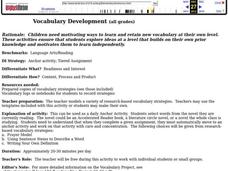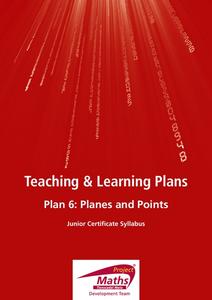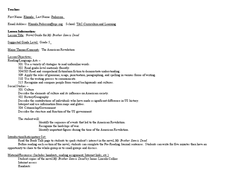Curated OER
Understanding Core Values Using the Frayer Model
Students complete the Frayer Model. In this literature instructional activity, students review the concept of theme in literature. Students identify major themes in books they've read. Students learn the attributes of the Frayer Model...
Curated OER
Skate Party
Learners use the Frayer model during problem solving. In this problem solving instructional activity, they examine multiple methods of data collection to solve real world problems. Resources are provided.
Curated OER
Vocabulary Development
Learners utilize various vocabulary strategies. They use vocabulary logs to record strategies they have been taught, such as the Frayer Model (definition, picture, examples, non-examples), writing their own definitions, and using...
EngageNY
Conducting Research: Analyzing Text from the Qikiqtani Inuit Association (QIA)
Scholars read excerpts from the Qikiqtani Inuit Association website as they begin researching their case studies on the Mary River Project. They read an article to build background knowledge and analyze key vocabulary words using the...
EngageNY
Synthesizing Text Details to Explain Relationships: “Medicine and Healing”
After reading the section about medicine and healing in The Inuit Thought of It, leaners determine what they feel was the most important resource to surviving in the Arctic environment. They support their opinions with details from...
K20 LEARN
Things Are Lit at Thornfield: Jane Eyre
Jane Eyre offers scholars an opportunity to practice reading comprehension skills. Pairs are assigned a word from the text, use their prior knowledge, and consider the context, connotation, and denotation of the word to posit a...
EngageNY
Launching A Midsummer Night’s Dream: The Universal Appeal of Shakespeare, Part 2
As scholars prepare to read Shakespeare's A Midsummer Night's Dream, they first read the article "Shakespeare's Universal Appeal Examined" and analyze its central idea. Next, pupils complete Frayer Model worksheets to understand better...
National Nanotechnology Infrastructure Network
Understanding Wave Motion - Slinky vs. Snaky: Which Spring is Dominant?
Ride the wave to an understanding of refraction! The first in a series of two inquiry-based lessons challenges learners to create transverse waves with two different types of springs. As their wave hits an object, they observe the change...
Curated OER
Finding Circumference and Area of a Circle
Young geometers explore the concept of circumference and area of circles. They discuss what information is needed to find circumference and area. The resource employs several instructional methods: Frayer Model for Vocabulary, literature...
Cornell University
The Making of Macromolecules
Compare and contrast macromolecules made from the same elements. Young scholars learn how the structure of a molecule has as much influence on a compound as the elements in the molecule. They experiment with molecular model kits to...
Project Maths
Planes and Points
Build a solid foundation on which to develop future concepts. Through a guided exploration, learners compare and contrast the characteristics of points, lines, planes, rays, and segments. They measure lengths and practice notation for...
Curated OER
Vocab Grabbing the Preamble to the U.S. Constitution
Students identify concrete and abstract nouns in the preamble to the Constitution, and complete Frayer Model graphic organizers using history and current events as examples of American values. In this preamble lesson plan, students use...
Curated OER
Dilations- What a Stretch!
High schoolers perform dilation on various geometric shapes. They also discuss pros and cons of dilation and employ the Frayer Model to study the vocabulary words in this section.
Cornell University
Glued into Science—Classifying Polymers
Explore the unique characteristics of polymers. A complete lesson begins with a presentation introducing polymers. Following the presentation, young scientists develop a laboratory plan for creating substances using polymers. They...
Statistics Education Web
Using Dice to Introduce Sampling Distributions
Investigate the meaning of a sample proportion using this hands-on activity. Scholars collect data and realize that the larger the sample size the more closely the data resembles a normal distribution. They compare the sample proportion...
Virginia Department of Education
Radical Equations
Provide students with the skill for how to examine algebraic and graphical approaches to solving radical equations. Learners solve various radical equations involving square root and cube root expressions. They first solve...
LABScI
Taxonomy: Who is in My family?
Find similarities in seemingly unlike organisms. The second instructional activity in a series of 12 builds the concept of a taxonomy and explores the use of a dichotomous key. Learners begin in part one by attempting to group a set of...
Virginia Department of Education
Organizing Topic: Probability
The probability is high learning will occur! A well-designed unit introduces learners to the concepts of independent, dependent, and mutually exclusive events. Using Venn diagrams, the lessons ask learners to analyze many different...
EngageNY
Establishing Structures for Reading: Gathering Evidence about Salva’s and Nya’s Points of View (Reread Chapters 1 and 2)
Readers practice gathering textual evidence to support their understanding of character point of view in A Long Walk to Water by Linda Sue Park. Working with partners, they complete a Gathering Evidence graphic organizer and engage in...
American Chemical Society
The Periodic Table and Transuranium Elements
The periodic table has so much more to it than meets the uninformed eye. An inquiry-based lesson leads learners through the history of the discovery of several transuranium elements. They then use informational resources to build a...
Curated OER
Mastering Math Vocabulary
Fifth graders investigate factors by utilizing mathematical terms. In this number sense lesson, 5th graders discuss and define terms such as factors, multiples, and denominators. Students create a Venn Diagram when...
Curated OER
Novel Guide for My Brother Sam is Dead
Fifth graders explore the effects of war. In this American Revolution lesson, 5th graders read My Brother Sam is Dead and complete the provided comprehension, characterization, and vocabulary activities
Curated OER
Looking at Constitutions
Young scholars work in groups to research and examine Constitutions from various countries. In this government and public interests activity, students analyze primary and secondary documents to make a comparison between constitutional...
University of Minnesota
Connect the Neurons!
Create a neuron frenzy as your pupils play the part of the neurons. An engaging activity creates a human chain of neurons that pass cotton balls posing as neurotransmitters. Scholars learn about pre- and post-synapses as they...























